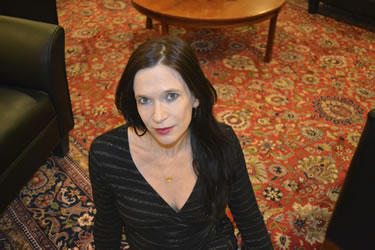|
When I began the manuscript that eventually became my first published book, I was living in the drafty upstairs of a beach house with two fellow graduate students who seemed to think I was weird, and their two cats who also kept their distance. I would sit in my room avoiding the housemates by sleeping through the day and then staying up all night working. "Working." I'd met an agent who'd asked for a proposal for a nonfiction book, and I had a soft deadline. I had taken an extra third year in my MFA fiction program ostensibly to finish my thesis, which was short stories. But the stories were done, and what I really needed to do was launch myself into the next episode of my existence—life after a graduate teaching fellowship—with something that would promise earnings into the future, my nonfiction book idea.
The problem was, the word deadline gave me a feeling of panic. It was as if the potential of the assignment could never match up with the reality. This failing had led me to quit my previous career as a freelance magazine writer: I'd blown off deadlines, gotten distracted, over-researched the pieces for women's magazines and under-researched the ones for political weeklies. I was terrible at negotiating the line between day job and night job.
All told, I spent seven years working on the nonfiction project. I felt lost. I spent much of that seven years turning leerily from my piles of research documents and answering the call of short stories. As a teenager, I was a middling student at a top school. I smoked a lot of pot. It took me years to get over a sense that I was fundamentally mediocre, unable to focus intellectually, incapable of finishing anything or applying myself.
During those seven years I moved back home to New York. I didn't get another job or seek out a career; I buoyed my income by freelance copyediting. I was working on the book, ostensibly. This would fuel my real "career"—as a nonfiction author. I took every residency offer I got, to facilitate the writing, traveling six times to residencies in Europe and three to the West Coast, funding it all with credit card loans and the copyediting lucre, and keeping down my expenses by subletting my apartment. But I wasn't finishing the book project at all. I'd returned to the short stories.
I'd met the agent when he'd visited the MFA program; he'd described story writing as a valiant project, a pet, so to speak, that one should continue doing "during one's free time." He had no interest in representing such work. I could not say I "worked" on the short stories. They worked on me, consuming me in feelings of guilt and self-doubt. I would never be anything if I couldn't stick to my project and further my career as a writer—a published writer, not one squirreling away her words like Emily Dickinson. With the stories, an escape mentality seized me.
One time, an editor asked me for a rewrite of a short story, and the strangest thing happened. I avoided the rewrite by going back to the nonfiction book. From that point, the nonfiction project began growing into something more artful, a memoir. Now I had two night jobs—stories, still a passion in spite of the stutter, and the book. The book was supposed to be the day job, but unwittingly, I'd found myself in a situation where one day job—copyediting—was funding the other day job—the book. I suppose only then could I pour my heart into the book. When it was "work," I didn't want to do it.
When the nonfiction manuscript finally sold, it was as a book in progress. The publisher wanted a rewrite. My anxiety about finishing got channeled into a kind of obsessive escapism—into the world of my stories again, stories where my characters had no responsibilities, no one who was waiting for them to succeed at any certain thing. They had, rather, obsessions, sometimes otherworldly or delusional ones. They let themselves disappear into imaginary worlds where the grail was something unreal or unattainable—the perfect child, the perfect love, bliss of some sort, Samadhi, enlightenment. They achieved bliss, though, through escape: Diving into a mile deep volcanic lake in Guatemala, allowing themselves to be lured into a kidnapper's den through sexual teasing. They were reckless and passionate.
There is something about giving in to the procrastinator in oneself. It is one's most childlike incarnation. No one ever told me the stories would be lucrative or amount to anything. That they are now coming out as a collection with a small press is not just an icing on the cake for me—it is a testament to artful obsession, to letting go expectations, the quest for reward or compensation. Born of anxiety and passion, the stories are for me a portrait of my subconscious, the world I escape to, the person I am when I am not practical.
|


